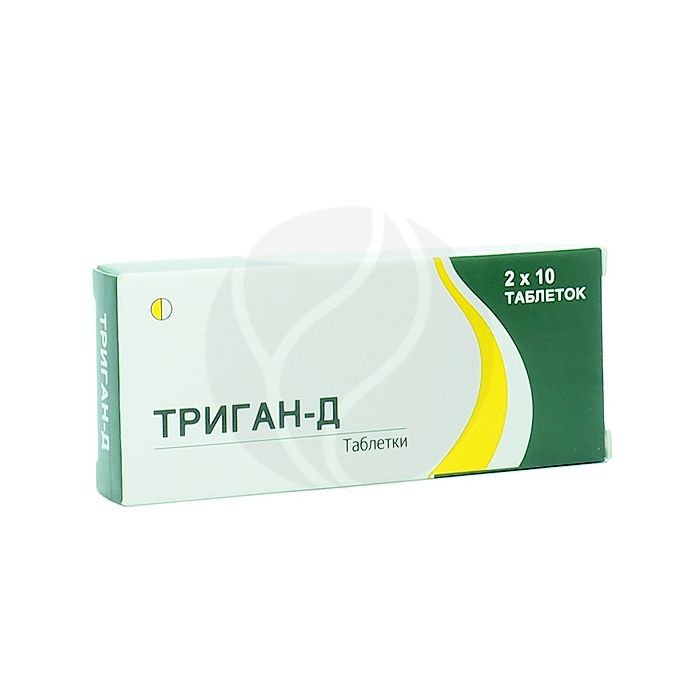Trigan-D tablets, No. 20
Expiration Date: 05/2027
Russian Pharmacy name:
Триган-Д таблетки, №20
Spasm of smooth muscles of internal organs;
intestinal, hepatic and renal colic;
algodismenorrhea;
headache, toothache, migraine pain;
neuralgia;
myalgia;
infectious and inflammatory diseases accompanied by fever.
Inside, 1-2 tables. 2-3 times a day. The maximum single dose is 2 tablets, the daily dose is 4 tablets.
Duration of admission is no more than 5 days.
The tablets are white, round, flat, smooth, with beveled edges and a score on one side.
1 tab.
paracetamol 500 mg
dicycloverine hydrochloride 20 mg
Hypersensitivity to paracetamol and dicycloverin;
obstructive bowel disease;
peptic ulcer and 12 duodenal ulcer (exacerbation phase);
reflux esophagitis;
hypovolemic shock;
myasthenia gravis;
pregnancy;
lactation period;
children's age (up to 15 years).
It should be used with caution in patients with severe hepatic or renal dysfunction, in the genetic absence of glucose-6-phosphate dehydrogenase, blood disease, glaucoma, benign hyperbilirubinemia (including Gilbert's syndrome), viral hepatitis, alcoholic liver damage, alcoholism, in old age ...
pharmachologic effect
Paracetamol, which is part of the drug, has an analgesic, antipyretic and slight anti-inflammatory effect. The mechanism of action is associated with moderate inhibition of cyclooxygenase-1 and, to a lesser extent, cyclooxygenase-2 in peripheral tissues and the central nervous system, which results in inhibition of the biosynthesis of prostaglandins modulators of pain sensitivity, thermoregulation and inflammation.
The second component of dicycloverine is tertiary amine hydrochloride, which has a relatively weak non-selective m-anticholinergic and direct myotropic antispasmodic effect on the smooth muscles of internal organs. In therapeutic doses, it causes effective relaxation of smooth muscles, which is not accompanied by the side effects characteristic of atropine.
The combined action of the two components of Trigana-D provides relaxation of spasmodic smooth muscles of internal organs and relieves pain.
Pharmacokinetics
The drug is well absorbed in the gastrointestinal tract. Cmax in blood plasma is reached after 60-90 minutes. Vd - 3.65 l / kg. Paracetamol is metabolized in the liver with the formation of several metabolites, one of which, N-acetyl-benzoquinomine, under certain conditions (drug overdose, lack of glutathione in the liver) can have a damaging effect on the liver and kidneys. About 80% of the drug is excreted in the urine and in small quantities in the feces.
Side effect
From the gastrointestinal tract: dry mouth, loss of taste, loss of appetite, epigastric pain, constipation, increased activity of liver enzymes, usually without the development of jaundice, hepatonecrosis (dose-dependent effect).
Allergic reactions: skin rash, itching, urticaria, Quincke's edema, exudative erythema multiforme (including Stevens-Johnson syndrome), toxic epidermal necrolysis (Lyell's syndrome).
Side of the central nervous system (usually develops when taking high doses): drowsiness, dizziness, psychomotor agitation and disorientation.
From the endocrine system: hypoglycemia, up to hypoglycemic coma.
From the side of hematopoiesis: anemia, methemoglobinemia (cyanosis, shortness of breath, heart pain), hemolytic anemia (especially for patients with gluco-6-phosphate dehydrogenase deficiency).
From the genitourinary system: pyuria, urinary retention, interstitial nephritis, papillary necrosis.
From the side of the organs of vision: mydriasis, blurred vision, accommodation paralysis, increased intraocular pressure.
decreased potency.
Application during pregnancy and lactation
The drug is contraindicated during pregnancy and lactation.
Application for violations of liver function
It should be used with caution in patients with severe hepatic dysfunction.
Overdose of the drug can cause liver failure.
Application for impaired renal function
It should be used with caution in patients with severe renal impairment.
Application in children
The drug is contraindicated in children under 15 years of age.
Use in elderly patients
Use the drug with caution in elderly patients.
special instructions
With caution and under the supervision of a physician, the drug should be used in patients with impaired liver or kidney function, simultaneously with other anti-inflammatory and analgesic drugs, as well as with anticoagulants and drugs that affect the central nervous system. If you are taking metoclopramide, domperidone, or cholestyramine, you should also consult your doctor.
Paracetamol distorts laboratory tests when quantifying plasma uric acid and glucose.
In order to avoid toxic damage to the liver, paracetamol should not be combined with the intake of alcoholic beverages, as well as taken by persons prone to chronic alcohol consumption. The risk of developing liver damage increases in patients with alcoholic hepatosis.
Influence on the ability to drive vehicles and control mechanisms:
When using the drug, one should refrain from potentially hazardous activities that require increased concentration and speed of psychomotor reactions (driving, etc.)
During long-term treatment, it is necessary to control the picture of peripheral blood and the functional state of the liver.
Overdose
Symptoms: tachycardia, tachypnea, fever, agitation, convulsions, epigastric pain, loss of appetite, anemia, thrombocytopenia, hemolytic anemia, aplastic anemia, methemoglobinemia, pancytopenia, nephrotoxicity (papillary necrosis), hepatonecrosis.
Treatment: stop taking the drug, do gastric lavage, prescribe adsorbents, introduce drugs that increase the formation of glutathione (intravenous acetylcysteine) and enhance conjugation reactions (methionine inside).
Drug interactions
The action of dicycloverine enhances amantadine, class I antiarrhythmic drugs, antipsychotics, benzodiazepines, MAO inhibitors, narcotic analgesics, nitrates and nitrites, sympathomimetic drugs, tricyclic antidepressants.
Dicycloverine increases the concentration of dioxin in the blood (due to a slowdown in gastric emptying).
Stimulants of microsomal oxidation in the liver (phenytoin, ethanol, barbiturates, rifampicin, phenylbutazone, tricyclic antidepressants) increase the production of hydroxylated active metabolites, which makes it possible to develop severe intoxication with small overdoses of paracetamol. Adrenostimulants, as well as other drugs with anticholinergic action, increase the risk of side effects. Inhibitors of mykerosomal oxidation (cimetidine) reduce the risk of hepatotoxic effects.
Reduces the effectiveness of uricosiric drugs.
Paracetamol increases the effectiveness of indirect anticoagulants.

